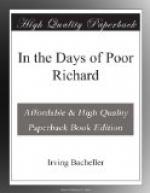In spite of his knowledge even Solomon himself could not sleep. A little before daylight they arose and began to stir about.
“I was badly burnt by that fire,” Jack whispered.
“Inside!” Solomon answered. “So was I. My soul were a-sweatin’ all night.”
The morning was chilly. They gathered birch bark and dry pine and soon had a fire going. Solomon stole over to the thicket where the woman and child were lying and returned in a moment.
“They’re sound asleep,” he said in a low tone. “We’ll let ’em alone.”
He began to make tea and got out the last of their bread and dried meat and bacon. He was frying the latter when he said:
“That ’ere is a mighty likely womern.”
He turned the bacon with his fork and added:
“Turrible purty when she were young. Allus hated the rum business.”
Jack went out on the wild meadow and brought in the cow and milked her, filling a basin and a quart bottle.
Solomon went to the thicket and called:
“Mis’ Scott!”
The woman answered.
“Here’s a tow’l an’ a leetle jug o’ soap, Mis’ Scott. Ye kin take the boy to the crick an’ git washed an’ then come to the fire an’ eat yer breakfust.”
The boy was a handsome, blond lad with blue eyes and a serious manner. His confidence in the protection of his mother was sublime.
“What’s yer name?” Solomon asked, looking up at the lad whom he had lifted high in the air.
“Whig Scott,” the boy answered timidly with tears in his eyes.
“What! Be ye skeered o’ me?”
These words came from the little lad as he began to cry. “No, sir. I ain’t skeered. I’m a brave man.”
“Courage is the first virtue in which the young are schooled on the frontier,” Jack wrote in a letter to his friends at home in which he told of the history of that day. “The words and manner of the boy reminded me of my own childhood.
“Solomon held Whig in his lap and fed him and soon won his confidence. The backs of the horses and the cow were so badly galled they could not be ridden, but we were able to lash the packs over a blanket on one of the horses. We drove the beasts ahead of us. The Indians had timbered the swales here and there so that we were able to pass them with little trouble. Over the worst places I had the boy on my back while Solomon carried ‘Mis’ Scott’ in his arms as if she were a baby. He was very gentle with her. To him, as you know, a woman has been a sacred creature since his wife died. He seemed to regard the boy as a wonderful kind of plaything. At the camping-places he spent every moment of his leisure tossing him in the air or rolling on the ground with him.”
[Illustration: Solomon Binkus with Whig Scott on his shoulder.]
“One day when the woman sat by the fire crying, the little lad touched her brow with his hand and said:




